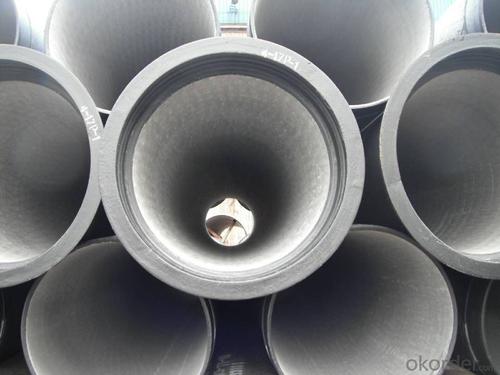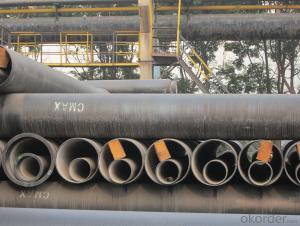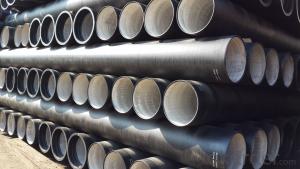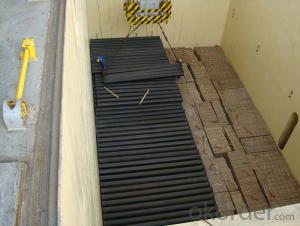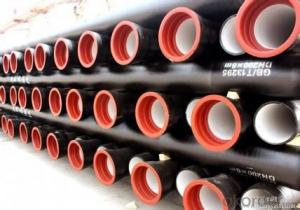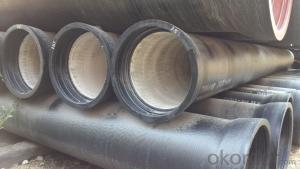DUCTILE IRON PIPE DN900
- Loading Port:
- China Main Port
- Payment Terms:
- TT OR LC
- Min Order Qty:
- -
- Supply Capability:
- -
OKorder Service Pledge
OKorder Financial Service
You Might Also Like
Specification:
1) The standard of pipe: ISO2531:1998, K9
2) Effective length: 6m
3) Inner cement line: Portland cement line as per ISO4179
4) Zinc coating: at least 130g/m2 as per ISO8179
5) Bitumen painting: at least 70um as per ISO8179
6) With 100% quantity of NBR ring, or SBR ring, or EPDM ring as per ISO4633
7) DN80mm-800mm
8) High strength, lighter than grey iron, good corrosion resistance, no furring, small flow resistance, easy fixing, long life tome about 100 yeas
9) Produced by Hangzhou chunfeng machine
10) Checked by automatic inspection equipment
11) Composition:
Chemical composition | |||
Chemical composition | Ductile Cast Iron Pipe (%) | Grey iron pipe (%) | Steel pipe (%) |
C | 3.5-4.0 | 3.2-3.8 | 0.1-0.2 |
Si | 1.9-2.6 | 1.4-2.2 | 0.15-0.4 |
Mn | 0.15-0.45 | 0.4-0.6 | 0.3-0.6 |
P | ≤0.06 | ≤0.3 | 0.02-0.03 |
S | ≤0.02 | ≤0.1 | 0.02-0.03 |
Mg | 0.03-0.06 |
|
|
12) Feature:
Mechanical properties | |||
| Ductile Cast Iron Pipe | Grey Iron Pipe | Steel Pipe |
Tensile Strength(Mpa) | ≥420 | 150-260 | ≥400 |
Yield Strength(Mpa) | ≥300 | No Confirmation | No Confirmation |
Bending Strength(Mpa) | ≥590 | 200-360 | ≥400 |
Elongation (%) | ≥10 | Neglected | ≥18 |
Brinell Hardness(HBS) | ≤230 | ≤230 | About 140 |
13) T type mechanical joint
14) Packing: in bulk or container
- Q: Are ductile iron pipes suitable for mining applications?
- Yes, ductile iron pipes are suitable for mining applications. Ductile iron is a type of cast iron that has been treated to enhance its strength, durability, and ductility. These pipes are known for their high tensile strength and resistance to corrosion, making them ideal for underground mining operations where they may be exposed to harsh conditions. One of the key advantages of ductile iron pipes in mining applications is their ability to withstand high pressure and heavy loads. They have excellent structural integrity and can resist both internal and external forces, ensuring reliable performance in demanding mining environments. Additionally, ductile iron pipes have a long service life and require minimal maintenance. They are highly resistant to abrasion, which is crucial in mining operations where abrasive materials like rocks, minerals, and ores are present. The smooth inner surface of these pipes also minimizes friction, allowing for efficient transportation of mining materials. Moreover, ductile iron pipes are cost-effective compared to alternative materials like steel or concrete. They have a lower upfront cost and require less frequent replacements, resulting in reduced long-term expenses for mining companies. In conclusion, ductile iron pipes are well-suited for mining applications due to their strength, durability, resistance to corrosion and abrasion, long service life, and cost-effectiveness. These pipes provide reliable and efficient transportation of mining materials, contributing to the overall efficiency and productivity of mining operations.
- Q: Can ductile iron pipes be used for water distribution networks?
- Yes, ductile iron pipes can be used for water distribution networks. Ductile iron is a type of cast iron that has enhanced flexibility and strength, making it suitable for various applications, including water distribution systems. Ductile iron pipes have been widely used in water supply networks due to their durability, corrosion resistance, and long lifespan. They can withstand high pressure and are resistant to external loads and ground movement, which makes them ideal for underground installations. Ductile iron pipes are also commonly used for transporting potable water as they are non-toxic and do not contaminate the water supply. Furthermore, ductile iron pipes have excellent hydraulic properties, ensuring efficient water flow and minimizing friction losses. Their smooth interior surface helps to prevent the buildup of deposits, reducing the risk of clogging and maintaining a consistent water flow. Overall, ductile iron pipes provide an effective and reliable solution for water distribution networks, ensuring the safe and efficient transportation of water to communities and industries.
- Q: What is the minimum pipe diameter of cast iron pipe?
- Nominal diameter of continuous grey cast iron pipe is 75~1200 mm, minimum 75 mm, maximum 1200 mm.
- Q: How do ductile iron pipes handle thermal expansion and contraction?
- The exceptional ability of ductile iron pipes to handle thermal expansion and contraction is well-known. This ability stems from their distinctive composition and design, which enable them to endure temperature fluctuations without sustaining significant harm or deformation. Thermal expansion arises when a material expands as a result of increased temperature, while thermal contraction refers to the contraction that occurs when a material cools down. Ductile iron pipes effectively accommodate these temperature changes by utilizing their inherent flexibility and strength. A key factor that enables ductile iron pipes to manage thermal expansion and contraction is their high ductility, which refers to their capacity to deform without breaking. This ductility allows the pipes to absorb the forces of expansion and contraction without developing cracks or ruptures. Additionally, the composition of ductile iron pipes includes graphite nodules, which act as microcracks that can absorb stress and prevent material fracturing. This unique microstructure enhances the pipes' resistance to thermal expansion and contraction. Furthermore, ductile iron pipes are often designed with joints that allow for limited movement. These joints, such as mechanical joints or push-on joints, can accommodate pipe expansion and contraction by offering a certain level of flexibility. This helps prevent the pipes from being excessively stressed or damaged. In conclusion, ductile iron pipes are specifically engineered to effectively handle thermal expansion and contraction. Their high ductility, unique microstructure, and joint design make them a robust and dependable choice for applications where temperature variations are expected.
- Q: How are ductile iron pipes manufactured?
- Ductile iron pipes are manufactured through a process known as centrifugal casting, which involves the use of a spinning mold. The process begins with the selection and preparation of high-quality ductile iron, which is a type of cast iron that contains small amounts of magnesium to enhance its strength and ductility. First, the ductile iron is melted in a furnace at extremely high temperatures. Once the molten iron reaches the desired temperature, it is poured into a spinning mold. The spinning mold is designed in the shape of a pipe, and it rotates at a high speed to distribute the molten iron evenly along its inner surface. As the mold spins, the molten iron cools and solidifies against the mold walls. This rapid cooling results in a fine-grained structure and enhances the mechanical properties of the pipe, such as its strength and durability. The spinning mold continues to rotate until the pipe has completely solidified, which typically takes a few minutes. After solidification, the pipe is removed from the mold, and excess material, known as the "skin," is removed. The skin is typically removed by machining or grinding to achieve the desired dimensions and surface finish. Next, the pipe undergoes heat treatment to further enhance its mechanical properties and reduce internal stresses. Once the heat treatment is completed, the pipe is thoroughly inspected for any defects or imperfections. This includes visual inspections, non-destructive testing methods, and pressure testing to ensure the pipe meets the required specifications and standards. If any defects are detected, the pipe may be repaired or rejected depending on the severity of the issue. Finally, the pipes are coated with a protective layer to prevent corrosion and enhance their longevity. This coating can be applied through various methods, such as cement mortar lining, epoxy coating, or zinc coating. Overall, the manufacturing process of ductile iron pipes involves melting the iron, centrifugal casting, cooling, skin removal, heat treatment, inspection, and coating. This process ensures the production of high-quality pipes that possess excellent strength, durability, and resistance to corrosion.
- Q: How do ductile iron pipes handle dynamic loads?
- Ductile iron pipes are known for their exceptional strength and durability, which allows them to effectively handle dynamic loads. These pipes have a high resistance to bending and can withstand the pressure and stress exerted on them when subjected to dynamic loads, such as water hammer or ground movement. The unique composition of ductile iron, which includes a small amount of carbon and the addition of magnesium, creates a structure that is both strong and flexible. This combination enables the pipes to flex under the impact of dynamic loads, rather than fracturing or breaking like other materials. Additionally, ductile iron pipes have a high impact resistance, which means they can absorb and distribute the energy generated by dynamic loads throughout their structure. This ability to dissipate energy helps to minimize the risk of pipe failure and ensures the longevity of the pipeline system. Furthermore, ductile iron pipes have excellent stress distribution properties, which means that the load applied to the pipes is evenly dispersed along their length. This helps to prevent localized stress concentrations and reduces the likelihood of damage or failure. In summary, ductile iron pipes are designed to handle dynamic loads efficiently. Their strength, flexibility, impact resistance, and stress distribution properties make them highly suitable for applications where dynamic loads are a concern, ensuring the reliability and longevity of the pipeline system.
- Q: Is ductile iron pipe breakable?
- 1 、 the drainage pipe is easy to fold. Folding is formed on the surface of various drainage pipe line, the longitudinal defects often throughout the entire product;2, poor drainage pipe surface prone to scarring;3, inferior drainage pipe, no metallic luster, is pale red or similar to the color of pig iron;4, inferior drainage pipe easily scratch, because the inferior material manufacturers equipment is simple, easy to produce burr, scratches the drainage pipe surface. Deep scrape reduces the strength of the ball drain;
- Q: Can ductile iron pipe be used for industrial applications?
- Yes, ductile iron pipe can be used for industrial applications. Ductile iron pipes are known for their durability, strength, and resistance to corrosion, making them suitable for various industrial settings. They can handle high-pressure and heavy-duty applications, making them ideal for industries such as water and wastewater, oil and gas, and chemical processing.
- Q: How is ductile iron pipe recycled?
- Ductile iron pipe is a highly durable and long-lasting material used in various infrastructure systems such as water and wastewater pipelines. When it reaches the end of its life cycle, ductile iron pipe can be recycled rather than disposed of in landfills. The process of recycling ductile iron pipe begins with its removal from the ground. Typically, a trench is dug to access the pipe, and it is cut into smaller, manageable sections using specialized equipment. These sections are then transported to a recycling facility. At the recycling facility, the ductile iron pipe is further processed to remove any contaminants. This involves removing any fittings or joints that may be attached to the pipe. Any non-iron materials, such as rubber gaskets or coatings, are also separated and discarded. Once the pipe has been cleaned and prepared, it is usually crushed or shredded into smaller pieces. This step increases the surface area of the material, making it easier to melt down in the next stage of the recycling process. The crushed or shredded ductile iron pipe is then melted in a furnace at high temperatures. This process, known as smelting, converts the solid iron into a liquid state. During smelting, impurities and any remaining non-iron materials rise to the surface and are skimmed off. After smelting, the molten iron is poured into molds to form new products. These molds can be used to produce a wide range of ductile iron products, including new pipes, fittings, valves, and manhole covers. The new products made from recycled ductile iron pipe have the same qualities and durability as those made from virgin materials. Recycling ductile iron pipe not only reduces the demand for new materials but also helps conserve energy and resources. The process requires less energy compared to producing iron from raw materials, which results in a lower carbon footprint. Additionally, recycling ductile iron pipe helps to reduce waste and promotes a circular economy by giving new life to an otherwise discarded material.
- Q: What are the different corrosion protection options for ductile iron pipe?
- There are several corrosion protection options available for ductile iron pipe to ensure its longevity and durability. These options include: 1. Cement Mortar Lining: This involves coating the inner surface of the pipe with a layer of cement mortar, which acts as a barrier between the pipe and corrosive elements in the water or soil. Cement mortar lining provides excellent corrosion resistance and can last for several decades. 2. Polyethylene Encasement: This method involves wrapping the ductile iron pipe with a layer of polyethylene material. The polyethylene acts as a physical barrier, protecting the pipe from external corrosive elements. Polyethylene encasement is commonly used in aggressive soil conditions and can offer long-lasting protection. 3. Internal and External Coatings: Various types of coatings can be applied to the inner and outer surfaces of the ductile iron pipe to provide corrosion resistance. These coatings can be epoxy, polyurethane, or fusion-bonded epoxy (FBE) coatings. These coatings create a barrier between the pipe and the surrounding environment, preventing corrosion. 4. Cathodic Protection: This method involves using an electrical current to protect the pipe from corrosion. Cathodic protection systems can be either galvanic (sacrificial anode) or impressed current systems. These systems direct the flow of electrons to prevent the oxidation of the ductile iron pipe. 5. Zinc Coating: Zinc coating, also known as galvanizing, involves applying a layer of zinc to the surface of the ductile iron pipe. The zinc acts as a sacrificial anode, corroding instead of the iron pipe. Zinc coating provides effective corrosion protection, particularly in soil conditions with low resistivity. It's important to note that the choice of corrosion protection option for ductile iron pipes depends on various factors such as the environment, water chemistry, soil conditions, and expected service life. Consulting with corrosion protection specialists and engineers can help in selecting the most suitable option for specific applications.
Send your message to us
DUCTILE IRON PIPE DN900
- Loading Port:
- China Main Port
- Payment Terms:
- TT OR LC
- Min Order Qty:
- -
- Supply Capability:
- -
OKorder Service Pledge
OKorder Financial Service
Similar products
Hot products
Hot Searches
Related keywords




